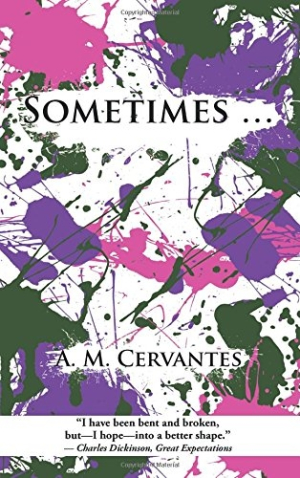
Sometimes...
Sometimes … is a fresh take on one boy’s journey through young adulthood.
A. M. Cervantes’s Sometimes … is a comprehensive look at the classic coming-of-age story found in much of American literature. Grappling with love, sexuality, substance abuse, and the often difficult search for purpose, Sometimes … manages to carve out a unique and memorable place in the wealth of stories about growing.
Diamond High School sophomore Mitchell Delgado Zeno struggles to fit in after transferring from Mexico City. He has to deal with his drunken but well-meaning stepfather and with romantic feelings for both his male music instructor and his friend Teddy’s girlfriend, in addition to other infatuations. He struggles with the difficulties that come with any set of young relationships, and other teenage related issues.
Each of the fourteen chapters serves as a new level of insight into Mitchell’s story. There’s an enticing religious bent throughout the book, present in both the biblical verses used as epigraphs and the tone of Mitchell’s conflicted relationship with the church. Religion is the constant in the story as Mitchell is expelled from Diamond and is subsequently enrolled in Armistice Academy.
The book doesn’t follow any particular arc, but the use of first person provides immediate immersion into Mitchell’s story and makes it easy to just go along for the ride as he oscillates between finding and losing himself again. There’s a familiar, youthful innocence in Mitchell’s internal thoughts that include “I’m not afraid, I endorse the night. I pledge to always live as a nocturnal creature, beautiful or not.” The juxtaposition of his persistence and despair carries the emotional marathon of a story.
The many errors with spelling, grammar, and punctuation are compensated for by the complex and memorable characters, from the once and former love Ernesto to the good friend Yolanda, and of course, Mitchell himself. Their relationships and independent spirits serve as a meditation on what it means to be young. Cervantes gets the quick of it when he considers the fact that “the freedom that comes with youth is costly more than anything, and it’s everything but free.”
The story is universal enough to appear timeless, but small cultural details, from drug preference to music taste, are telling of a more contemporary tale. The novel ends climactically, but it’s only the first book, so there’s most likely more to come in Mitchell’s tumultuous story. Sometimes … is a fresh take on one boy’s journey through young adulthood.
Reviewed by
Lillian Brown
Disclosure: This article is not an endorsement, but a review. The publisher of this book provided free copies of the book and paid a small fee to have their book reviewed by a professional reviewer. Foreword Reviews and Clarion Reviews make no guarantee that the publisher will receive a positive review. Foreword Magazine, Inc. is disclosing this in accordance with the Federal Trade Commission’s 16 CFR, Part 255.
